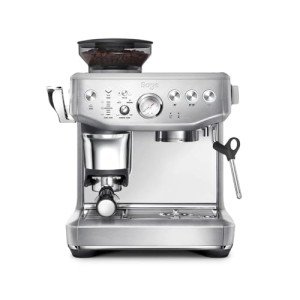7 Simple Secrets To Completely Rocking Your Home Use Espresso Machines
Home Use Espresso Machines: A Comprehensive Guide
Espresso machines have become a staple in numerous families as coffee lovers seek to duplicate café-quality brews in the comfort of their cooking areas. The rise in popularity has led to a varied market filled with different models, features, and prices. This post aims to supply a useful overview of home use espresso machines, helping readers navigate their alternatives effectively.
Comprehending Espresso Machines
Espresso machines work by forcing hot water through finely-ground coffee under high pressure, leading to a concentrated coffee drink referred to as espresso. There are a number of kinds of espresso machines categorized based upon their brewing methods and level of automation. The most common types consist of:
Manual Espresso Machines: These need the user to control the pressure and water flow, enabling for a more hands-on coffee-making experience.
Semi-Automatic Espresso Machines: These provide automatic control over water pressure, while the user manually grinds and tamps the coffee.
Automatic Espresso Machines: With the push of a button, these machines instantly manage the flow of water, making it simpler to brew espresso with constant outcomes.
Super-Automatic Espresso Machines: These all-in-one machines deal with grinding, tampering, developing, and even milk frothing, making them ideal for users looking for benefit.
Capsule or Pod Machines: These use pre-packaged coffee pods to develop espresso with minimal effort, but they restrict choice in developing methods and flavors.
Table: Comparison of Espresso Machine Types
Type
Control Level
Relieve of Use
Cleaning up Level
Suitable For
Manual
User-controlled
Moderate
High
Coffee perfectionists
Semi-Automatic
Partial automation
Moderate
Moderate
Home baristas
Automatic
Totally automated
Easy
Low
Hectic individuals
Super-Automatic
Completely automated
Extremely easy
Really low
Convenience applicants
Capsule/Pod
Completely automated
Really simple
Extremely low
Casual drinkers
Secret Features to Consider
When selecting a home use espresso machine, it's necessary to think about different features that can substantially impact the quality of espresso and user experience.
Pressure: Look for machines that offer at least 9 bars of pressure, as this is thought about optimum for developing espresso.
Boiler Systems: Single vs. dual boiler systems identify temperature level stability and the ability to brew espresso and steam milk concurrently.
Grinder: Integrated grinders permit freshly ground coffee, which boosts taste. Think about machines with adjustable grind settings.
Milk Frother: For those who enjoy cappuccinos and lattes, a built-in steam wand or automatic frother is vital.
Size and Design: Consider your kitchen area and visual choices. Machines are available in various sizes, from compact to large setups.
Price: Home espresso machines can range from a few hundred to several thousand dollars, so it's crucial to develop a budget before exploring options.
Pros and Cons of Home Use Espresso Machines
Pros
Cons
Convenience of brewing coffee in the house
Preliminary investment can be high
Quality of espresso is typically superior
Requires some skill, specifically with manual machines
Ability to experiment with tastes
Maintenance and cleansing can be labor-intensive
Can conserve money in the long run
Not all machines will match every coffee preference
Maintenance and Cleaning Tips
Preserving an espresso machine is important for extending its life and guaranteeing consistent brew quality. Here are some helpful pointers:
Regular Descaling: Minerals from water can construct up in the machine. Descale every 1-3 months, depending on water firmness.
Daily Cleaning: Rinse portafilters, baskets, and steam wands after each use to avoid coffee oils from constructing residue.
Use Filtered Water: This can help in reducing mineral accumulation and enhance the taste of coffee.
Change Gaskets and Seals: These components may wear out over time and must be replaced to keep pressure and efficiency.
Check out the Manual: Each machine has specific care instructions; following these will guarantee longevity.
Frequently Asked Questions About Home Use Espresso Machines
**Q1: What is the best budget espresso machine?The best budget espresso machine frequently depends on private needs, however designs like the DeLonghi EC155 or the Breville Bambino are popular amongst users for offering terrific worth. Energy-Efficient Espresso Machines : How long do home espresso machines normally last?With proper upkeep, home espresso machines can last anywhere from 5 to 15 years, depending upon the quality of the machine and frequency of use. Q3: Can I make coffees and lattes with any espresso machine?While most espresso machines can make cappuccinos and lattes, having a trustworthy
steam wand or frother is essential for attaining the ideal milk texture.
Q4: Are super-automatic machines worth the investment?For those who focus on convenience and fast brewing, super-automatic machines can be worth the financial investment, though they may do not have some customizability in brew strength and flavor. Q5: What types of coffee beans are best for espresso?While personal choice contributes, beans identified as” espresso “blends are normally roasted darker, creating rich tastes and a velvety texture when brewed.
Investing in a home espresso machine can change the everyday coffee routine into something special, elevating home brews to café quality. By understanding the various types of machines, crucial features to think about, upkeep requirements, and weighing the
advantages and disadvantages, consumers can make educated decisions that fit their specific preferences. As the espresso culture continues to grow, no matter the choice, every brew can be a scrumptious experience waiting to be appreciated.  **
**